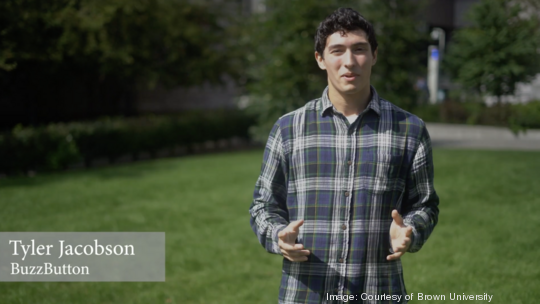
The Breakthrough Lab (B-Lab) hosted by Brown University’s Jonathan M. Nelson Center for Entrepreneurship recently graduated its seventh cohort of young and promising startups. The program culminated with a showcase where all 15 of the companies presented to an audience composed of Brown students, investors and other members of the startup ecosystem. B-Lab is an eight-week accelerator program for students from either Brown University or the Rhode Island School of Design.
The program seeks to foster startups that can make impact at scale by providing mentoring and workshops, co-working space at the Nelson center and a scholarly award of $4,000 for currently-enrolled students. Let’s meet the first seven members of the cohort.
Bamboo Chats
Asian Americans are underrepresented at the manager level in the U.S. workforce. Although the group makes up 12% of all U.S. workers, only 1.9% of all corporate officers are Asian American. This is due to a complex sociological phenomenon called the “Bamboo ceiling,” barriers that prevent Asian Americans from reaching management-level positions.
To help Asian Americans tackle this challenge, Christine Han, an East Asian studies major, has launched the platform Bamboo Chats, which sets up half-hour online chats between Asian American college students and current Asian American professionals in hopes of building a network for the students before they enter the workforce. Since B-Lab, Han has launched the company’s Alpha platform with around 250 users.
Basq
Basq, which was founded by recent Brown graduate Brantley Leaphart, is aiming to improve the virtual art experience by creating a platform revolutionizing the virtual art-buying process.
Artists and consumers will submit qualitative and quantitative data about their art preferences that will help Basq to make appropriate suggestions for consumers. Each artist and potential buyer will record their answer to the question: What does art mean to you? Then prospective buyers will complete an onboarding survey about their preferred media, colors and styles to help the Basq platform make suggestions. There will also be live artist sessions, pre-recorded reaction pieces and other content. The company plans to charge a 15% commission on each transaction.
BuzzButton
Sai Allu and Tyler Jacobson are creating the BuzzButton, a portable, low-cost, lightweight and powerful charger built on a 5,000-year-old button spinner toy to market to the tens of millions of people in the U.S. that go on overnight hiking and camping trips each year. The device will weigh under 1 pound and generate 20 watts of electricity, the amount of power needed to charge the most recent iPhone battery in less than 25 minutes. The BuzzButton team, which expects to file a full utility patent by November, will begin by selling the charger directly to consumers online and then through retailers.
Dangy
Artificial intelligence experts Jason and Elijah Whang have created an AI-powered mobile app that recommends restaurant dishes based on individual and group taste profiles. Dangy first asks users to rate a few of their favorite dishes. Then it provides a list of top dishes for them to try and once they find their new favorite dish, users can rate dishes based on taste, spiciness and value and give feedback to help restaurants improve. Users can also share fun TikTok-like videos of food hacks, taste tests and more.
The company also plans to offer a subscription service to restaurants to learn why people don’t like certain dishes. The team estimates that a 5% conversion rate on cost-per-click results in $1 billion of revenue annually in the U.S. alone. Dangy just released its Alpha platform, which the founders say can correctly predict a given user’s dish rating 91% of the time. The company is set to launch at the end of the year.
Emit
Emit, a platform founded by Brandon Li, Nathaniel Goldman and Anderson Addo, acts as a central hub for what’s going on around college campus. Users can send "flares" through the app which let people know about activities or events going on, whether it’s a football game on the quad, a big barbecue or a new club having its first meeting.
enRoot
Launched by Jeffrey Martin, a master’s student at Brown, EnRoot is an Atlanta-based real estate development cooperative company that seeks to pair large vacant commercial properties with farmers seeking to expand their businesses and operations. EnRoot wants to buy vacant properties with 10,000 square feet of space, retrofit them with hydroponic farming equipment, and then lease them to farmers near urban centers, so they can grow low cost, high profit and high turnover produce with a yield of $42 per square foot.
Enroot will obtain the buildings, which will cost $50,000 to equip with farming equipment, and then lease them to the farmers for $65,000, which will be paid through a revenue share throughout a two- to five-year lease. Farmers can make up to four times more with crops they grow year-round and with the low overhead equipment, Martin says. The founder is in the process of recruiting 30 to 50 farmers in the metro Atlanta area to join enRoot’s first cohort.
Enjoy meeting these seven companies? Come back next week to meet the remaining eight ventures in the 2021 B-Lab cohort



